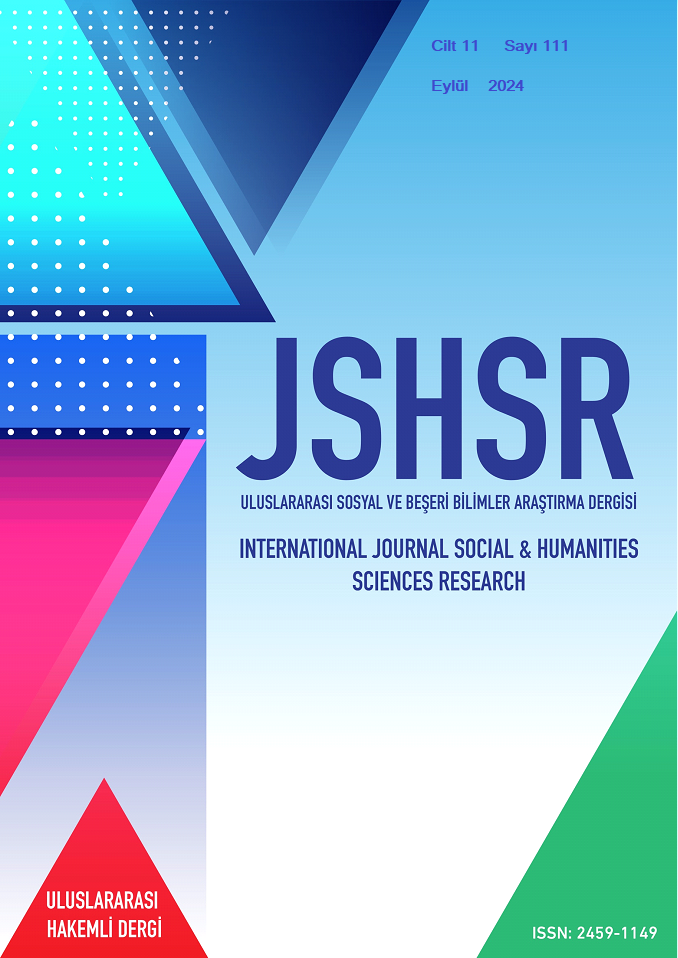Lojistik Sektöründe Güvenli Davranış: Bilinçli Organizasyonun Düzenleyicilik Rolü
DOI:
https://doi.org/10.5281/zenodo.13864149Anahtar Kelimeler:
Güçlendirici Liderlik, Güvenli Davranış, Bilinçli OrganizasyonÖzet
Bu çalışmada, güçlendirici liderlik, güvenli davranış ve bilinçli organizasyon arasındaki ilişki incelenmiştir. Araştırma, lojistik sektöründe aktif olarak çalışan firmalarda görev yapan personele yönelik olarak gerçekleştirilmiştir. Çalışmanın amacı, güçlendirici liderlik özelliklerinin güvenli davranışlar üzerindeki etkisini belirlemek ve bilinçli organizasyonun bu ilişkideki düzenleyici rolünü değerlendirmektir. Veri toplama aracı olarak anket yöntemi kullanılmış, elde edilen veriler Statistical Package fort he Social Sciences (SPSS) yazılımı aracılığıyla yapısal eşitlik modeli (YEM) ile analiz edilmiştir. Araştırma bulguları, bilinçli organizasyonun düzenleyici rolünü desteklememektedir. Diğer yandan güçlendirici liderliğin performansa güven boyutu ile güvenli davranış arasında pozitif ve anlamlı bir ilişki bulunmuştur. Bu sonuçlar, organizasyonlarda güvenli davranışı teşvik etmek için performansa güvenin önemini vurgulamakta ve diğer araştırılan değişkenlerin etkisinin sınırlı olduğunu göstermektedir.
Referanslar
Ahearne, M., Mathieu, J. E., Rapp, A. (2005). To Empower or Not to Empower Your Sales Force? An Empirical Examination of the Influence of Leadership Empowerment Behavior on Customer Satisfaction and Performance. Journal of Applied Psychology, 90(5), 945–955.
AlShemeili, H., Davidson, R., Khalid, K. (2022). Impact of Empowering Leadership on Safety Behavior and Safety Climate: Mediating and Moderating Role of Safety Monitoring. Journal of Engineering Design and Technology. 22(4).
Asamani, L. (2020). Promote Safety Culture and Enhance Safety Performance through Safety Behaviour. European Journal of Business and Management Research, 5(4).
Buranapin, S., Limphaibool, W., Jariangprasert, N., Chaiprasit, K. (2023). Enchancing Organizational Resilience through Mindful Organizing. Sustainability, 15(3):2681, 1-14.
Choi, S., & Lee, S. (2020). The Impact of Safety Management Practices on Safety Performance in The Logistics Industry. Safety Science, 129, 104817.
Christopher, M. (2016). Logistics & Supply Chain Management. Pearson UK.
Clarke, S. (2006). The Relationship Between Safety Climate and Safety Performance: A Meta-Analytic Review. Journal of Occupational Health Psychology, 11(4), 315-327.
Clarke, S. (2012). The Effect of Challenge and Hindrance Stressors on Safety Behavior and Safety Outcomes: A Meta-Analytic Review. Journal of Occupational Health Psychology, 17(4), 387-97.
Çekmecelioğlu, H. G. (2014). Göreve ve İnsana Yönelik Liderlik Tarzlarının Örgütsel Bağlılık, İş Performansı ve İşten Ayrılma Niyeti Üzerindeki Etkileri. Kocaeli Üniversitesi Sosyal Bilimler Dergisi, (28), 21-34.
Düger, Y. S. (2021). The Effect of Empowering Leadership on Employees’ Innovative Behavior: The Role of Affective Commitment and Psychological Empowerment. Pamukkale Üniversitesi Sosyal Bilimler Enstitüsü Dergisi (46), 479-496.
Gajda, D., Zbierowski, P. (2022). Exploring The Consequences of Mindfulness At Work: The Impact of Mindful Organizing on Employee Attitudes and Behavior Toward Work and Organization. Personnel Review, Vol. 52 No. 9, pp. 2342-2362.
Gracia, F. J., Tomás, I., Martinez-Córcoles, M., Peiró, M. J. P. (2020). Empowering Leadership, Mindful Organizing and Safety Performance in a Nuclear Power Plant: A Multilevel Structural Equation Model. Safety Science, 123.
Hieu, V. M. (2020). Employee Empowerment and Empowering Leadership: A Literature Review. Technium, Vol. 2, 20-28.
Hofmann, D. A., & Stetzer, A. (1996). A Cross-Level Investigation of Factors Influencing Unsafe Behaviors and Accidents. Personnel Psychology, 49(2), 307-339.
Jin, M., Lee, J., Lee, M. (2017). Does Leadership Matter in Diversity Management? Assessing The Relative Impact of Diversity Policy and Inclusive Leadership in The Public Sector. Leadership & Organization Development Journal, 38(2), 303-319.
Lee, Y., Lu, Yang, C.C., Chang, G. (2019). A Multilevel Approach on Empowering Leadership and Safety Behavior in the Medical Industry: The Mediating Effects of Knowledge Sharing and Safety Climate. Safety Science, 117, 1-9.
Martinez-Córcoles, M., Vogus, T. J. (2020). Mindful Organizing for Safety. Safety Science, 124 (1), 1-5.
Neal, A., Griffin, M. (2006). A Study of the Lagged Relationships Among Safety Climate, Safety Motivation, Safety Behavior, and Accidents at the Individual and Group Levels. Journal of Applied Psychology, Vol. 91, No.4, 946-953.
Northouse, P. G. (2018). Leadership: Theory and Practice (8th ed.). Sage Publications.
Petitta, L., Martinez-Córcoles, M. (2022). A Conceptual Model of Mindful Organizing for Effective Safety and Crisis Management. The Role of Organizastional Culture. Current Psychology, 42, 25773-25792.
Renecle, M., Tomas, I., Gracia, F. J., Peiró, J. M. (2020). Spanish Validation of the Mindful Organizing Scale: A Questionnaire For The Assessment of Collective Mindfulness. Accident Analysis and Prevention, 134.
Sharma, P. N., & Kirkman, B. L. (2015). Leveraging Leaders: A Literature Review and Future Lines of Inquiry for Empowering Leadership Research. Group & Organization Management, 40, 193-237.
Spreitzer, G. M. (2007). Taking Stock: A Review of More Than Twenty Years of Research on Empowerment At Work. The Handbook of Organizational Behavior, 54-72.
Ta, M. T. D., Kim, T., Gausdal, A. H. (2022). Leadership Styles and Safety Performance in High-Risk Industries: A Systematic Review. Safety and Reliability, 41(1), 10-44.
Zohar, D. (2000). A Group-Level Model of Safety Climate: Testing The Effect of Group Climate on Microaccidents in Manufacturing Jobs. Journal of Applied Psychology, 85(4), 587-596.
Zohar, D., & Luria, G. (2003). The Use of Supervisory Practices as Leverage to Improve Safety Behavior: A Cross-Level Intervention Model. Journal of Safety Research, 34(5), 567-577.
İndir
Yayınlanmış
Nasıl Atıf Yapılır
Sayı
Bölüm
Lisans
Telif Hakkı (c) 2024 International Journal of Social and Humanities Sciences Research (JSHSR)

Bu çalışma Creative Commons Attribution 4.0 International License ile lisanslanmıştır.


